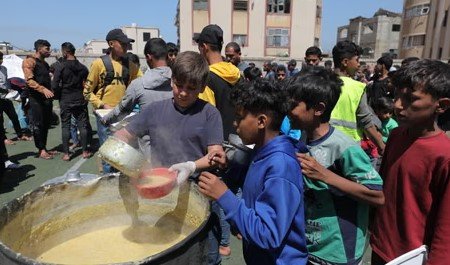Heavy shelling in central Gaza displaces more families as hostage rescue remains elusive
Israel deepened its military push into the heart of the Gaza Strip on Monday, sending tanks into Deir al-Balah for the first time since the war began 21 months ago. The incursion — part of a search-and-destroy mission targeting Hamas infrastructure — has raised urgent alarms among hostage families and international observers as civilian casualties mount and diplomatic patience wears thin.
New terrain, old scars: Tanks roll through a crowded refuge
Deir al-Balah has long been seen as a relative shelter for displaced Palestinians fleeing northern and southern combat zones. But that fragile illusion was shattered just after dawn, when the rumble of Israeli Merkava tanks was heard across its eastern and southern flanks.
The Israeli military claims the area may be concealing hostages, though no public evidence has been presented. “We have credible intelligence that Hamas is hiding hostages in tunnel networks beneath civilian buildings,” a senior Israeli defense official told local media, speaking on condition of anonymity.
For hundreds of displaced families already crammed into UN schools and tents, the invasion came with terrifying urgency.
“We ran again, for the third time this year,” said Huda Faraj, a mother of four who had just settled in a makeshift shelter two weeks ago. “The children were screaming when the tanks started firing. We have nowhere left to go.”

Deaths rise as homes, mosques hit
The immediate toll was swift and bloody. Palestinian medics confirmed that three people were killed and several others wounded when tank fire struck a residential block and a nearby mosque. The dead included a teenage boy, a cleric, and an elderly woman who was reportedly praying inside the mosque at the time.
In a separate strike south in Khan Younis, an Israeli air assault killed five members of a single family — a husband, wife, and their two young children sheltering in a tent — along with a cousin who had joined them hours earlier.
The Gaza Health Ministry reported that at least 130 Palestinians were killed and more than 1,000 injured in the past 24 hours alone, making it one of the deadliest days since May.
“There are no safe zones left in Gaza. Not Deir al-Balah, not Khan Younis, not Rafah,” said Dr. Riyad Hamdallah, a surgeon at Al-Aqsa Martyrs Hospital. “Every tent, every shelter, every ambulance is a target now.”
UN condemns strike on guesthouses as ‘inexcusable’
As Israel widened its offensive footprint, the United Nations voiced sharp criticism after confirming that two UN guesthouses in Deir al-Balah were struck by Israeli fire, despite their coordinates having been shared with both parties in advance.
“These locations — as with all civilian sites — must be protected, regardless of evacuation orders,” said UN spokesperson Stéphane Dujarric in New York. “Attacks on UN facilities are inexcusable and potentially violate international law.”
UN staff are still present in the area, according to the world body, and emergency aid deliveries have been temporarily suspended until further notice.
TABLE: Summary of Deir al-Balah Incursion
| Aspect | Detail |
|---|---|
| Location | Deir al-Balah, central Gaza |
| Date of Israeli incursion | July 21, 2025 |
| Civilian casualties (24 hrs) | 130+ killed, 1,000+ injured (Gaza Health Ministry) |
| Target of operation | Suspected Hamas infrastructure, possible hostage locations |
| Strikes on civilian sites | Homes, mosques, UN guesthouses |
| UN reaction | Condemnation, suspension of aid distribution in the area |
| Israeli justification | “Credible intelligence” about tunnels and hostage presence |
Hostage families lash out: “We want them back alive, not entombed”
The military’s suggestion that hostages may be held in Deir al-Balah — long suspected but never confirmed — has reopened painful wounds for the families of over 120 Israelis and foreign nationals believed to still be in Hamas custody.
“We support operations to bring them home,” said Eyal Mizrachi, whose 19-year-old son was abducted from a border kibbutz last year. “But not at the cost of blowing up buildings they may be trapped in. We want them back alive, not entombed under rubble.”
A small group of hostage families gathered outside the Israeli Defense Ministry in Tel Aviv late Monday, holding candles and chanting, “Don’t abandon them. Don’t bury them.”
Despite multiple hostage rescue operations since October, only a handful have been freed. The IDF claims some have been moved into deeper tunnel networks or out of Gaza entirely.
Bullet points: Broader implications of the Deir al-Balah incursion
-
Escalation risk: The expansion of ground operations into central Gaza signals that Israel’s campaign may be far from winding down, despite growing international fatigue.
-
Diplomatic blowback: The UN’s condemnation and temporary aid suspension could sharpen global scrutiny of Israel’s targeting protocols.
-
Humanitarian crisis: Deir al-Balah was one of the last operational hubs for displaced civilians and NGOs; its destabilization may trigger a new refugee wave.
-
Political pressure at home: Families of hostages are increasingly split — some support the offensive as leverage, while others fear it may be fatal.
-
Uncertainty on goals: Analysts remain unsure whether Israel’s endgame is purely military or aimed at redrawing the demographic map of post-war Gaza.
Fractured lines of trust — and retreating hope
With tanks in Deir al-Balah and airstrikes resuming across southern Gaza, hope is retreating fast — not only for civilians but for diplomatic negotiators still pushing for a hostage-ceasefire exchange.
A Qatari-mediated framework appeared close to a breakthrough two weeks ago, but sources familiar with the talks say the recent escalation may have scuttled progress. Hamas has gone silent. Egypt’s mediators are reportedly “frustrated and sidelined.”
Meanwhile, Gaza’s humanitarian map is shrinking. Roads are bombed out. Hospitals are overwhelmed. Cemeteries are overflowing.
And for the families still searching for missing loved ones — Israeli and Palestinian alike — the only certainty is that time, and safety, are both in short supply.
